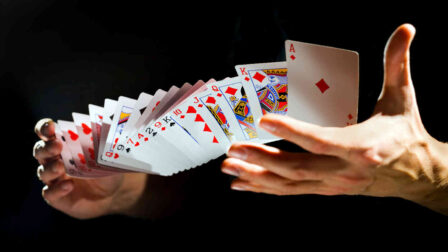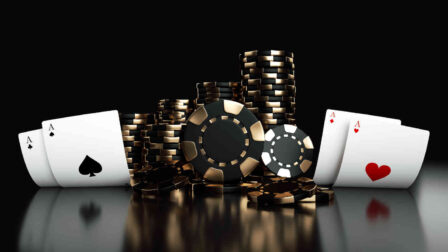Does a Straight Flush Beat Four of a Kind in Poker & Why?
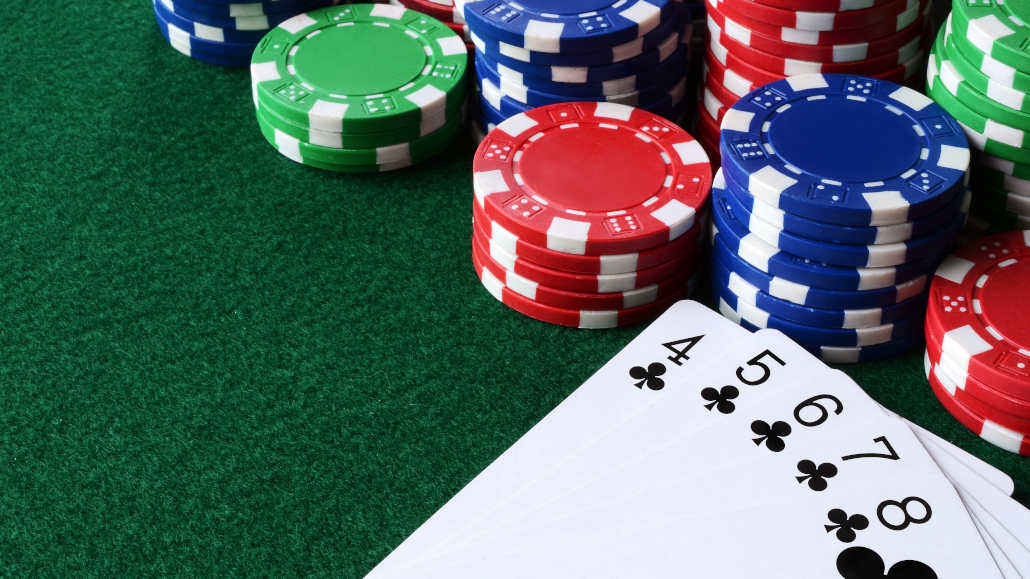
6 minutes
Last Updated: December 21, 2022
If you are wondering does a straight flush beat four of a kind, let's get right to the point and clear any doubts you might have about how these hand stack against each other.
Yes, a straight flush always beats four of a kind in poker!
Below we will break down these two hand combinations and answer all of the most common questions including how they are ranked individually and against other poker hands and what is the logic behind these hand rankings.
The Straight Flush Combination in Poker Explained
In poker, a card combination that consists of 5 sequential cards in the same suit is called a straight flush.
Here are two examples of straight flush combinations in poker:
- 10♣9♣8♣7♣6♣ – a ten-high straight flush
- K♠Q♠J♠10♠9♠ – a king-high straight flush
If all of the cards in a 5-card combination are of the same suit but are not in sequential order, this hand combination is called a flush, i.e.:
- J♣9♣8♣7♣5♣ – a jack-high flush in clubs
- K♦Q♦J♦10♦8♦ – a king-high flush in diamonds
If all of the cards in a 5-card combination are in sequential order but are not of the same suit, this combination is called a straight, i.e.:
- 9♦8♥7♥6♥5♥ – a nine-high straight
- Q♦J♦10♦9♦8♥ – a queen-high straight
Lastly, if the highest card in a straight flush combination is an ace, this card combination is called a royal flush. There are four possible royal flush combinations in poker.
- A♥K♥Q♥J♥10♥ – a royal flush in hearts
- A♦K♦Q♦J♦10♦ – a royal flush in diamonds
- A♣K♣Q♣J♣10♣ – a royal flush in clubs
- A♠K♠Q♠J♠10♠ – a royal flush in spades
Rules for Ranking Straight Flush Combinations in Poker
In poker, straight flush combinations are ranked based on the rank of the highest cards in the combination.
Here is how the rule is applied in practice.
- Hand 1) J♣10♣9♣8♣7♣ (a jack-high straight flush) vs.
- Hand 2) 10♣9♣8♣7♣6♣ (a ten-high straight flush)
In this example, Hand 1 outranks Hand 2 because the highest-ranking card in the first combination (J) outranks the highest-ranking card in the second combination (T).
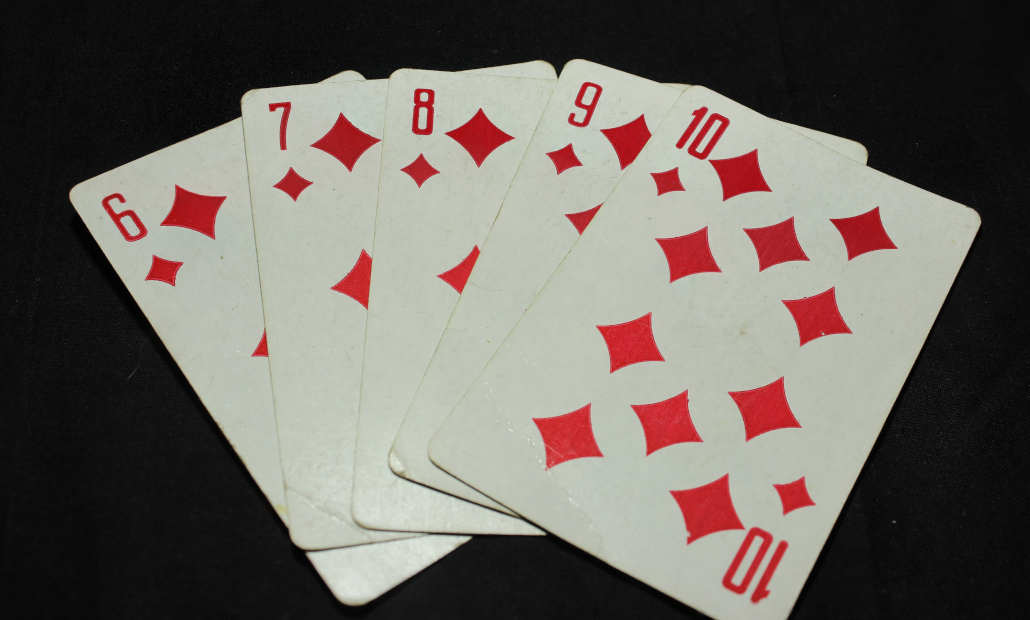
The rule of the highest-ranking card is also applied when it comes to both straight and flush combinations.
The Total Number of Straight Flush Combinations in Poker
The standard 52-card deck used for poker is divided into 4 suits (hearts, diamonds, spades, clubs) and each suit contains 13 different card ranks.
Based on the data above, we can calculate that there are:
- 36 unique straight flush combinations (9 for each suit)
- 10,200 unique straight combinations
- 4 unique royal flush combinations (A to T straight in the same suit)
Note that each suit has 10 possible straight flush combinations in theory. However, the highest ranking straight flush for each of the suits is called a royal flush and these straight flushes have their own category.
So, in practice, there are 36 possible straight flush combinations in poker.
The Four-of-A-Kind Combination in Poker Explained
A 5-card combination that contains four cards of the same rank and one card of a different rank (also known as the kicker) is called a four-of-a-kind or in other words quads.
Two examples of four-of-a-kind combinations in poker:
- Q♠Q♣Q♦Q♥A♠ – four of a kind or quad queens with an ace kicker
- 8♣8♠8♦8♥7♦ – four of a kind or quad eights with a seven kicker
Rules for Ranking Four of a Kind Combinations in Poker
The process of ranking four of a kind combinations in poker involves two steps:
- Using the rank of the four cards with the same rank
- Using the rank of the kicker
Here are some examples of how this process looks in practice.
- Hand 1) 5♠5♦5♣5♥A♣ (four of a king fives with an ace kicker) vs.
- Hand 2) 4♠4♦4♣4♥9♠ (four of a kind threes with a nine kicker)
In this example, because the ranking of the central part of the combination (quads) is different in both hands, we apply the first rule.
With this said, Hand 1 outranks Hand 2 because the rank of the quads (5s) in Hand 1 outranks the rank of the quads (4s) in Hand 2.
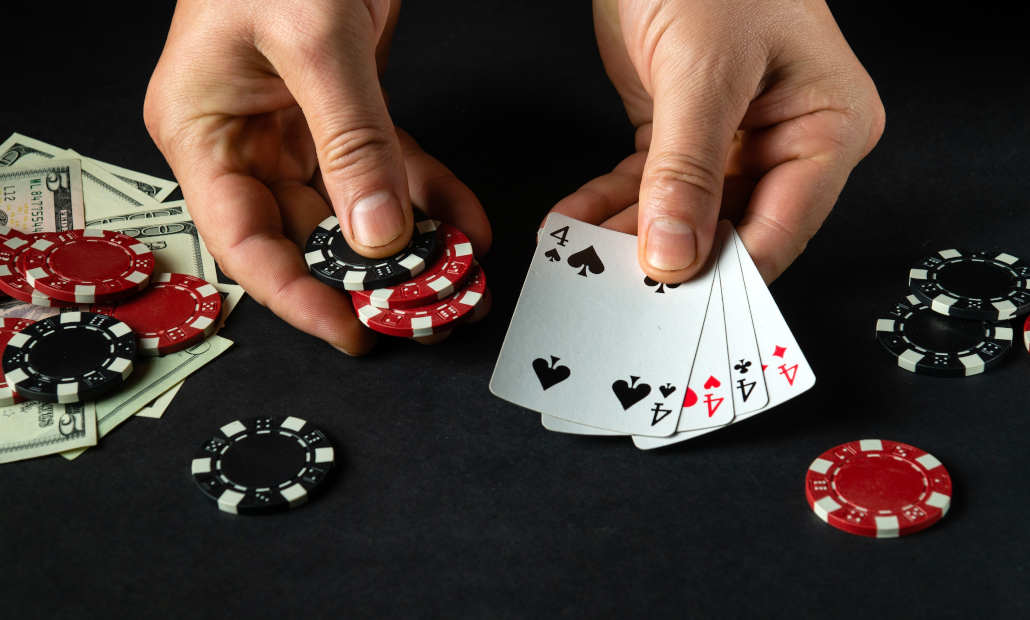
The second rule is only applied in situations in which combinations from both players have the same rank of the quads. These situations can only happen when multiple players are playing the board and there is already four of a kind on the board.
For example,
- Player A holds 10♠8♠ as his hole cards.
- Player B holds 8♣6♣ as his hole cards.
- The board is A♣A♦A♠A♥3♠
In this example, the best 5-card combination that Player A can make is A♣A♦A♠A♥10♠ (four-of-a-kind, aces, with a ten kicker, and the best 5-card combination that Player B can put together is A♣A♦A♠A♥8♣ (four-of-a-kind, aces, with an eight kicker).
Since the rank of the four of a kind is the same in both combinations, the rank of the kicker comes into play. Because of this Player A wins the hand since his combination contains a ten kicker (T) which outranks the kicker that Player B’s combination contains (8).
The Total Number of Four-of-a-Kind Combinations in Poker
Poker is played with a 52-card deck that is divided into 4 suits (hearts, diamonds, spades, and clubs) with each suit containing 13 different card ranks (A, K, Q, J, T, 9, 8, 7, 6, 5, 4, 3, 2).
So, in order to calculate the possible number of four-of-a-kind combinations we need to multiply the number of different card ranks by the number of kickers.
But first, to calculate the number of kickers, we need to subtract the 4 cards in the main part of the combination from the total number of cards.
- 51 – 4 = 48
Now we can multiply the number of different card ranks (13) by the number of kickers (48).
- 13 x 48 = 624
In poker, there are 624 possible four-of-a-kind combinations.
Does a Straight Flush Beat Four of a Kind in Poker?
Now, let's look at the math behind the ranking of four of a kind and a straight flush in poker.
Below is the table with all of the rankings of made hands in poker, which we will use as a reference in our calculations.
| Hand | Combinations | Probability | Odds |
| Royal Flush | 4 | 0.000154% | 649,739-to-1 |
| Straight Flush | 36 | 0.00139% | 72,192-to-1 |
| Four of a Kind | 624 | 0.02401% | 4,164-to-1 |
| Full House | 3,744 | 0.1441% | 693-to-1 |
| Flush | 5,108 | 0.1965% | 509-to-1 |
| Straight | 10,200 | 0.3925% | 254-to-1 |
| Three of a Kind | 54,912 | 2.1128% | 46-to-1 |
| Two Pair | 123,552 | 4.7539% | 20-to-1 |
| One Pair | 1,098,240 | 42.2569% | 1.37-to-1 |
As we’ve already mentioned (and as you can see from the table above) all of the hand rankings in poker are based on odds and frequencies.
To be more specific, the harder it is to put together a certain hand, the stronger that hand is in the overall hand rankings.
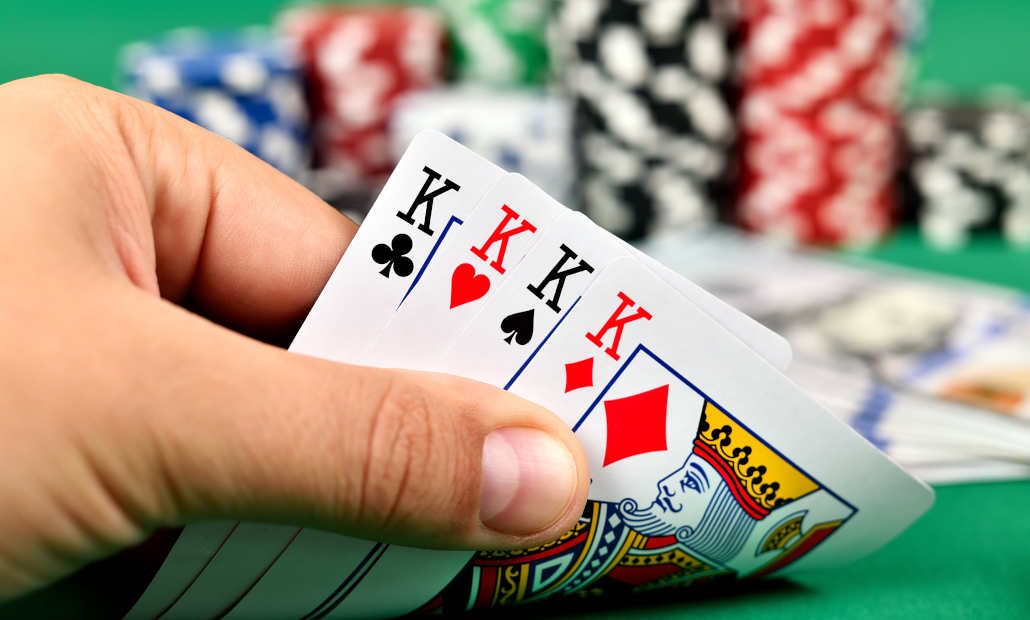
With this said, there are 36 possible straight flush combinations in poker and the odds of putting together this hand are 72,192-to-1 or 0.00139%, which is enough for it to be the 2nd strongest hand in poker.
On the other hand, there are 624 possible four-of-a-kind combinations in poker, which means that the odds for putting together this hand are 4,164-to-1 or 0.02401%. This is enough for this hand to be the 3rd strongest hand in poker.
As you can see from a mathematical standpoint, a straight flush beats four of a kind in poker because the odds of completing a straight flush are much lower than the odds of putting together four of a kind.



















